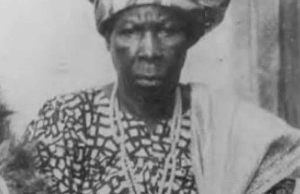The story of Nigeria’s first female King

Ahebi Ugbabe made history as the first and only female king in colonial Nigeria. She shattered gender norms, becoming the first woman to serve as a warrant chief, rule as king in an Igbo kingdom, and perform traditionally male roles like leading masquerades and marrying wives.
She was born in the late 19th century in Enugu-Ezike, an Igbo community in southeastern Nigeria, and her early life was marked by hardship and rebellion. She was forced into exile as a teenager after being selected as a bride for a deity, a punishment for her father’s sins. This punishment was known as igo ma ogo (to become the in-law of a deity).
Ahebi had to flee to Igalaland and during her forced exile, Ahebi became a commercial sex worker and used this work to her advantage by aligning herself with powerful men such as the ruler of Igala, and British colonial officials. Ahebi also learned to speak numerous languages, such as Igala, Nupe and Pidgin English.
How Did She Go From Being A Prostitute To A King?
In the early 20th century, when the British wanted to invade Igboland, Ahebi led the British forces into Enugu Ezike, her hometown, and because she was the only person in her village able to speak with the British, the invaders installed her as the village headman as a reward for her support.
She replaced the headman Ugwu, who was unable to communicate with the British, and her efficiency and continued loyalty caused her to be elevated to the post of warrant chief, a feat that was contrary to the British policy of female political exclusion in colonial Nigeria. The British District Officer W. H. Lloyd said Ahebi was:
a lady of influence and power. She was intelligent and of a quiet disposition, and when she does speak, it was usually to the point and sensible.
With the aid of the Attah (ruler) of Igala, whose power spread to Northern Igbo territory, Ahebi Ugbabe became king of Enugu-Ezike.
Her Reign As King
Ahebi’s reign as king defied gender norms on multiple levels, but it was also marked by controversial decisions that stirred resistance and ultimately led to her fall from grace. She performed male-only spiritual rituals, wore masks reserved for men during masquerade festivals, and even took on wives, women who were often escaping abusive marriages. These women bore children in her name, helping her extend her legacy.
She also imposed colonial mandates like censuses and taxes, acts that were unpopular and contributed to wider unrest, including the famous Women’s War of 1929. While she maintained power for years, her repeated violation of male-centred traditions, especially participating in secret masquerades, eventually led to her downfall.
Despite the British initially backing her, they later sided with the local male elders when her rule was challenged in court, leading to a loss of status and power.
Ahebi died in 1948 and, in her usual fashion, performed her burial rites before her death because she feared she would not be honoured appropriately. She organised a magnificent pre-death ceremony filled with music, gunfire, and animal sacrifice to ensure her memory endured.
Did She Do Too Much?
Maybe. But sometimes, “too much” is exactly what it takes to be remembered. From a modern feminist perspective, Ahebi Ugbabe was a trailblazer. She shattered every limitation placed on women in her era: she became a king, married wives, performed male-exclusive rituals, and held political power in a colonial system designed to exclude women.
But from the traditional and cultural standpoint of her people, Ahebi overstepped. She imposed British systems of labour and taxation that clashed with Igbo values. Her participation in sacred male-only rituals like the masquerade and her attempt to mask herself in a ceremony reserved for men were viewed as sacrilegious.
Nonetheless, though her reign was marked by controversy, she is remembered today as a symbol of courage, transformation, and gender defiance. In her mother’s hometown, she is still worshipped as a goddess and immortalised in songs and parables across Enugu-Ezike.
Source: www.pulse.ng





